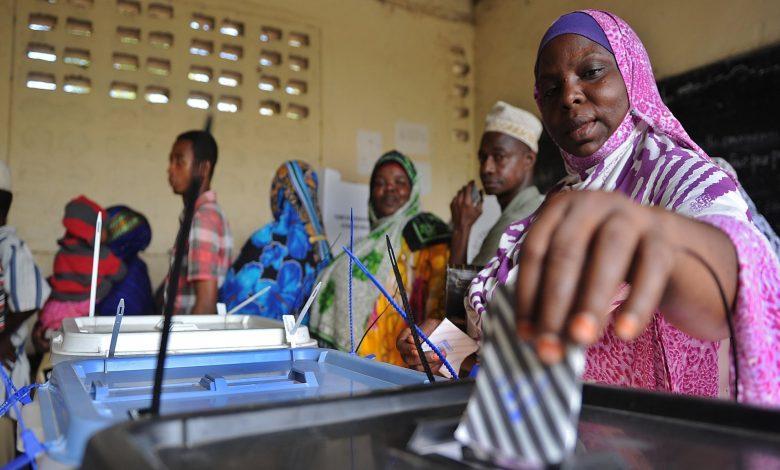Africa-Press – Tanzania. ZANZIBAR: AS preparations for the 2025 General Elections gains momentum, a rare wave of political and civil unity is sweeping across the isles, giving hope to citizens who have long witnessed election seasons marred by tension and violence.
From government leaders and political parties to civil society organisations (CSOs) and religious leaders, a growing chorus is calling for a peaceful, transparent and inclusive electoral process.
At the forefront of this push are top leaders- President Dr Samia Suluhu Hassan who maintains call for peace along with President Hussein Ali Mwinyi, who recently met with the Zanzibar Interfaith Peace Committee to reaffirm his administration’s commitment to ensuring free, fair and peaceful elections.
Speaking at the meeting, President Mwinyi emphasised that all electoral mechanisms will operate independently and transparently during the campaigns, voting and the announcement of results.
“Our goal is to maintain the peace that exists, for the benefit of our nation,” he said, while encouraging the Peace Committee to convene political leaders, including those from rival parties, for joint discussions on the importance of preserving peace before, during and after the polls.
The Peace Committee, formed in 2005, is composed of Islamic and Christian leaders and has increasingly played a mediating role in Zanzibar’s politically charged environment.
Its chair, Chief Mufti Sheikh Saleh Omar Kaab, reiterated the committee’s mission to foster calm and understanding across political and religious divides.
But calls for peace have not been limited to the ruling Chama Cha Mapinduzi (CCM) party, leaders of ACT-Wazalendo party, Zanzibar’s main opposition party and partner in the current Government of National Unity (GNU), have also echoed these sentiments.
First Vice President Othman Masoud Othman, a senior ACT-Wazalendo figure, recently underscored that Zanzibaris demand more than promises, they want credible elections that are free from manipulation and abuse.
“Citizens want peace, but peace must be rooted in justice and fairness,” Mr Othman said during a meeting with the Peace Committee at his Migombani office. He stressed that Zanzibar must confront the deeper causes of electoral tension, such as lack of transparency in voter registration, abuse of power and inflammatory rhetoric from political elites.
“We need to move toward a culture of civil political competition where winners are congratulated, not contested violently,” he said, adding that Zanzibar should learn from African countries that have transitioned peacefully through regime change.
Civil society organisations, meanwhile, have stepped up their advocacy to ensure vulnerable groups, especially women, youth and persons with disabilities, can participate safely and equally in the 2025 elections.
In a recent meeting with the Zanzibar Police Commissioner, CP Khamis Kombo Khamis, CSO representatives urged law enforcement to remain neutral, professional and protective of citizens’ rights.
Dr Mzuri Issa, Director of Tanzania Media Women Association (TAMWA)- Zanzibar, called on the police to ensure that women and people with disabilities can safely engage in the democratic process as voters, candidates and election agents.
“We still carry the trauma of the 2020 elections, where some of these groups were afraid or neglected and did not have full participation. We need to see changes this year,” she emphasised.
In response, CP Khamis reaffirmed the police’s readiness to work with CSOs and other stakeholders to uphold peace and accountability.
“We are committed to protecting all citizens, especially those most vulnerable and will take action against any officer who violates ethical conduct,” he said.
The renewed push for peaceful elections comes at a critical moment for Zanzibar. Although GNU has been in place since 2020, bringing together CCM and ACTWazalendo, the scars of past electoral violence, particularly in 2000, 2005 and 2015, remain fresh in the minds of many.
Today, however, signs are more encouraging. Religious leaders are preparing a nationwide peace campaign. Civil society is mobilised. Security agencies are promising reform and cooperation.
And political leaders from both the ruling and opposition camps are voicing similar messages: “Peace must come first.”
President Mwinyi has even advised the Peace Committee to go further, organising debates between political rivals to jointly pledge their commitment to peaceful conduct.
First Vice-President Othman, while voicing criticism of certain electoral institutions, still affirms that dialogue and mutual respect are essential.
It is this convergence of voices, from State House to grassroots organisations, that gives hope to ordinary Zanzibaris.
With the nation expected to send more than 2,000 citizens on Hajj this year, Dr Mwinyi reminded pilgrims to pray for peace in the isles, highlighting the deep spiritual value attached to national stability.
Zanzibaris, long weary of politically induced unrest, now sense an opportunity to redefine their electoral legacy.
And if these calls for unity, accountability and justice are matched by action, 2025 could mark a new chapter, one where democracy and peace finally go hand in hand.
Source: dailynews
For More News And Analysis About Tanzania Follow Africa-Press







